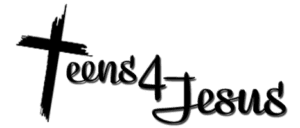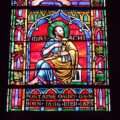By: Micah Messer
 One of my spiritual goals for this year is to read the entire Bible through in 2003. I made it through Genesis, Exodus, and Matthew okay, but Leviticus usually becomes harder reading for me with the animal sacrifices and ancient festivals. I was midway in the book when I remembered Jesus was a Jew. He was born a Jewish baby, raised by Jewish parents, attended a Jewish synagogue, and lived in a Jewish community, where all those ceremonial laws, animal sacrifices, and religious festivals were regularly performed and routinely practiced.
One of my spiritual goals for this year is to read the entire Bible through in 2003. I made it through Genesis, Exodus, and Matthew okay, but Leviticus usually becomes harder reading for me with the animal sacrifices and ancient festivals. I was midway in the book when I remembered Jesus was a Jew. He was born a Jewish baby, raised by Jewish parents, attended a Jewish synagogue, and lived in a Jewish community, where all those ceremonial laws, animal sacrifices, and religious festivals were regularly performed and routinely practiced.
You could not enter a Jewish village without feeling transformed into another world–where manners, customs, and habits was evidence that religion wasn’t merely a creed or an observance but pervaded every relationship and dominated every phase of life. And Jesus came from a devoutly religious Jewish family. Because Nazareth was a seven day journey from Jerusalem, Passover was not a requirement for His family, yet His parents went to Jerusalem every year at the feast of the Passover (Lk.2:41). Attending the synagogue on the Sabbath was their custom (Lk. 4:16). This careful observance of the Passover by Joseph and Mary shows how dedicated they lived in following the Law; and Jesus’ participation in the discussion with the teachers at the temple shows that He must have learned the law early, as a child at home and in the synagogue. Jesus and his family loved God. They did what even wasn’t required. Living for God was not a duty. It was devotion. They undoubtedly observed the offerings and attended the feasts. Then I started looking at Leviticus differently, wondering what it was like from Jesus’ perspective. How did Jesus view them?
There are five different offerings in Leviticus: the burnt offering, the grain offering, the peace offering, the sin offering, and the trespass offering (Lev 1-7). The burnt offering was for the atonement of sins where a male animal without blemish is sacrificed; the hand was placed on the head of the animal as a symbolic transfer of the sacrificer’s sin to the sacrificial animal. The grain offering of uncooked flour, baked flour, or roasted firstfruit grain was a voluntary offering given along with the burnt offering for thanksgiving to God. The peace offering symbolized the peace and fellowship of the worshiper with the Lord. Unlike the previous three, which were voluntary; the sin and trespass offering were required for unknowingly committing sins of commission or omission. They differ where restitution was impossible with sin offering and possible with trespass offering.
I’m curious what Jesus thought as He made these offerings in the temple, fully knowing that the priesthood and sacrifices were only symbolic shadows of Himself being our faithful and merciful High Priest and ultimate sacrifice. The burnt offering temporarily covered sin, yet He realized that His one time sacrifice on the cross would fully satisfy and atone the judgment and punishment for sin because of His sinless nature (Heb 9:12; 1 John 2:2). He understood the grain and peace offering symbolized His determined dedication and perfect peace with His Father. He knew the sin and trespass offerings symbolized His substitutionary death that paid for our redemption.
 Leviticus represented the Old Covenant while Hebrews speaks of the New Covenant. The Old Covenant was temporary with obsolete promises; a shadow of the new that is permanent with eternal promises (Heb 7:22, 8:6-13; 9:23-24; 10:20). The New Covenant has One sinless Priest forever, but the Old Covenant had several priests who had committed sins (Heb 6:19-7:16-27; 9:7). Under the Old Covenant were daily sacrifices of animals that were, sufficient for one year atonement, while under the New Covenant there is a once-for-all sacrifice by the Son of God for eternal propitiation (Heb 7:25-27; 9:11-26; 10:1-20). How clearly Christ must have seen His Father’s purpose and plan for Him every time He walked through the temple.
Leviticus represented the Old Covenant while Hebrews speaks of the New Covenant. The Old Covenant was temporary with obsolete promises; a shadow of the new that is permanent with eternal promises (Heb 7:22, 8:6-13; 9:23-24; 10:20). The New Covenant has One sinless Priest forever, but the Old Covenant had several priests who had committed sins (Heb 6:19-7:16-27; 9:7). Under the Old Covenant were daily sacrifices of animals that were, sufficient for one year atonement, while under the New Covenant there is a once-for-all sacrifice by the Son of God for eternal propitiation (Heb 7:25-27; 9:11-26; 10:1-20). How clearly Christ must have seen His Father’s purpose and plan for Him every time He walked through the temple.
Then there are the seven Jewish feasts (religious festivals) in Leviticus: the Feast of Passover, the Feast of Unleavened Bread, the Feast of Firstfruits, the Feast of Harvest (Pentecost), the Feast of Trumpets, the Day of Atonement and the Feast of Tabernacles (Lev 23). The Feast of Passover reminded the Jews of when the Angel of Death passed over the doorposts marked with blood in Egypt. The Feast of Unleavened Bread reminded the Jews of their quick exodus from Egypt. The Feast of Firstfruits was an expression of gratitude for God’s bountiful blessings. The Feast of Pentecost reminded the Jews of when God came down on the Mount Sinai in the wilderness 50 days after the Passover. The Feast of Trumpets (Rosh Hashanah) celebrated the seventh month of the year as the sabbatical month. The annual Day of Atonement (Yom Kippur) had the priest offering two goats, one as the sacrifice for the people and the other as a scapegoat, which would be freed and forgotten in the wilderness (Lev 16). The Feast of Tabernacles was seven days when the Israelites dwelled in booths to remind them of when they lived in tents in the wilderness.
And I’m also curious how Jesus felt as He attended these feasts each year. He knew each feast actually celebrated Him and testified of the wonderful works He did for His people and will do for His church.
When Jesus attended the Feast of Passover, He knew it testified of Him shedding His own blood as the Lamb of God. For Christ our Passover was sacrificed for us (1 Cor 5:7). When Jesus ate during the Feast of Unleavened Bread, He knew it testified of the Lord’s Supper which He would have with His disciples the night of Passover and serve to remind us of our communion with Him. Therefore let us keep the feast…with the unleavened bread of sincerity and truth. (1 Cor 5:8). When Jesus gave at the Feast of Firstfruits, He knew it testified of His resurrection and our coming resurrection. Christ the firstfruits afterward they that are Christ’s at His coming (1 Cor 15:23). When Jesus observed the Feast of Pentecost, He knew it testified of when the Holy Spirit would come down to dwell inside His people 50 days after His crucifixion (Acts 1:3,4; 2:1-4,36). When Jesus heard the trumpets blast during the Feast of Trumpets, He knew it testified when the Lord Himself will descend heaven to earth with the sound of a trumpet (1 Thes 4:16; 1 Cor 15:52). When Jesus was present during the Day of Atonement, He knew it testified when He would one day be the sacrifice for the sins of the people and we would be the scapegoat, free and forgiven with our sins forgotten. When Jesus camped during the Feast of Tabernacles, He knew it testified when the tabernacle of God will be with men, and He will dwell with them, and they shall be His people in the Holy City of New Jerusalem (Rev 21:3).
Suddenly, Leviticus didn’t seem like a burden to read anymore. The next time you read Leviticus, see Jesus the Jew in the animal sacrifices and ancient festivals, because Jesus saw Himself every time He observed the offering and attend the feasts.





Be the first to comment